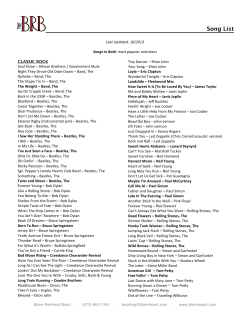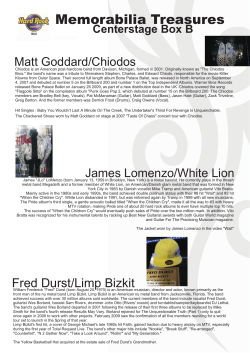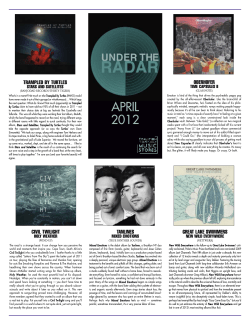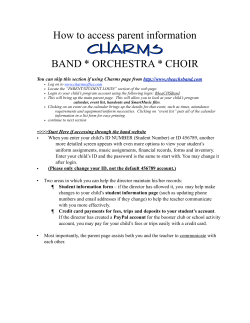
BRUCE SPRINGSTEEN
Bruce Springsteen BRUCE SPRINGSTEEN Born on September 23, 1949, in the town of Long Branch, New Jersey, Bruce Springsteen played the bar circuit while assembling his famous E Street Band. His breakout record "Born to Run" united arena rock with human-size tales of working-class America. Rock musician Bruce Springsteen was born September 23, 1949, in Long Branch, New Jersey. Springsteen was raised in a working-class household in Freehold Borough. The future Boss's father, Doug Springsteen, had trouble holding down a steady job and worked at different times as a bus driver, millworker and prison guard. Adele Springsteen, Bruce's mother, brought in steadier income as a secretary in a local insurance office. Young Bruce and his father had a difficult relationship. "When I was growing up, there were two things that were unpopular in my house," the singer later recalled. "One was me, and the other was my guitar." Years later, however, Springsteen suggested that his fraught relationship with his father had been important for his art. "I've gotta thank him," Springsteen said upon his induction to the Rock and Roll Hall of Fame, "because what would I conceivably have written about without him? I mean, you can imagine that if everything had gone great between us, we would have had disaster. I would have written just happy songs—and I tried it in the early '90s and it didn't work… Anyway, I put on his work clothes and I went to work. It was the way that I honored him. My parents' experience forged my own. They shaped my politics, and they alerted me to what is at stake when you're born in the U.S.A." Springsteen first fell in love with rock 'n' roll when he saw Elvis Presley perform on The Ed Sullivan Show. "[Elvis] was as big as the whole country itself," Springsteen later remembered, "as big as the whole dream. He just embodied the essence of it and he was in mortal combat with the thing. Nothing will ever take the place of that guy." Springsteen's mother took out a loan to buy him a $60 Kent guitar for his 16th birthday, and he hasn't stopped playing the instrument since then. An outsider and recluse in school, Springsteen frequently got in trouble at his Catholic elementary school. "In the third grade, a nun stuffed me in a garbage can under her desk because she said that's where I belonged," he said. "I also had the distinction of being the only altar boy knocked down by a priest during mass." Several years later, he skipped his own high school graduation because he felt too uncomfortable to attend. In 1967, an 18-year-old Springsteen was drafted for military service in the Vietnam War. But as he later told Rolling Stone magazine, the only thought in his head as he traveled to his induction was "I ain't goin'." Springsteen failed his physical, largely due to his deliberately "crazy" behavior and a concussion previously suffered in a motorcycle accident. Springsteen's 4-F classification—unfit for military service—freed him from having to go to Vietnam and allowed him to pursue music full-time. “The boss” By the late 1960s, Springsteen was spending most of his time in Asbury Park on the New Jersey Shore, playing in several different bands while he forged his unique sound and introduced audiences to the gravelly baritone voice for which he would later become famous. It was there that he first met the musicians who would later form his E Street Band. Around this time, Springsteen also acquired his nickname, "The Boss," because he had a habit of collecting money earned during shows and then distributing it evenly among his band mates. After signing with Columbia Records, Springsteen released his first studio album in 1972. Greetings from Asbury Park, N.J. garnered critical acclaim but slow sales. Many compared him to Bob Dylan for his introspective lyrics and poetic style, but this did not immediately help Springsteen make it big. Springsteen and the E Street Band followed their debut with The Wild, The Innocent, & The E Street Shuffle later the same year but found themselves lauded by critics but largely dismissed by the public. Born to run Finally, in 1975, after over a year in the studio, Springsteen released a third album, Born to Run, which peaked at No. 3 on the Billboard 200 and skyrocketed him to fame. Drawing heavily on Springsteen's New Jersey roots, the album offered soaring guitars, larger-than-life characters, urban romance and a rebellious spirit that captured the essence of the American Dream and connected with audiences of all ages. Springsteen's next album, Darkness on the Edge of Town, released in 1978, was a more somber affair, emphasizing themes of lost love, depression and existential suffering. "The whole force of Darkness was a survival thing," he said. "After Born to Run, I had a reaction to my good fortune. With success, it felt like a lot of people who'd come before me lost some essential part of themselves. My greatest fear was that success was going to change or diminish that part of myself." In order to promote the album, Springsteen and the E Street Band embarked on a cross-country tour that would make them famous for their marathon performances (three or four hours per show), boisterous behavior and infectious energy, captivating audiences from California to New York. During this time, Springsteen also became famous for his integrity and pride as a performer, as stories of his exhausting performances and perfectionism in the recording studio became legend. Born in the U.S.A. Darkness at the Edge of Town marked a shift in Springsteen's musical style that he continued in his next two albums, The River (1980) and Nebraska (1982), which both explored themes about working-class Americans. Nebraska was a raw, solo acoustic effort that has been lauded by music fans for its provocative sound. But Springsteen's explosion into rock superstardom came in 1984 when he released Born in the U.S.A. With seven singles hitting the top of the Billboard Charts—including "Glory Days," "Dancing in the Dark," "Born in the U.S.A." and "Cover Me"—the album would become one of the bestselling records of all time and spark a successful world tour. Bruce & Julianne After the whirlwind of commercial success that followed Born in the U.S.A., Springsteen met and married actress Julianne Phillips in 1985. The marriage quickly began to fall apart, however, and Springsteen began an affair with E Street Band backup singer Patti Scialfa, who shared his working-class New Jersey background. Phillips filed for divorce in 1989. Springsteen moved in with Scialfa and they had two children together before officially marrying in 1991. Their third and last child was born in 1994. Bruce and Julianne Deeply affected by his conflicted love life and failed marriage to Phillips, Springsteen wrote and released Tunnel of Love in 1987. The album examined themes of love, loss, confusion and heartbreak, tracing the extreme highs and lows of relationships. As Dave Marsh from Creem magazine prophetically wrote in 1975, "Springsteen's music is often strange because it has an almost traditional sense of beauty, an inkling of the awe you can feel when, say, first falling in love or finally discovering that the magic in the music is also in you. Which may also be first falling in love." E Street Band Springsteen dissolved the E Street Band in 1989 and relocated with his new wife and family to California in the early 1990s. The albums he produced during this period—Human Touch and Lucky Town, released on the same day in 1992—came from a happier place; ironically as his personal life improved, his songs seemed to lack the emotional intensity that had made him so famous in earlier years. He was criticized by his fans for "going Hollywood" and no longer recording with E Street Band. As happy as he may have been in his personal life, the early 1990s were not Springsteen's glory days as an artist. He began to bounce back with The Ghost of Tom Joad (1995), an acoustic set musically reminiscent of Nebraska and lyrically inspired by Pulitzer Prize–winning writers and books (John Steinbeck's The Grapes of Wrath and Dale Maharidge's Journey to Nowhere: The Saga of the New Underclass). Springsteen also recorded an Oscar-winning song, "The Streets of Philadelphia," for the movie Philadelphia, starring Tom Hanks. In 1999, Springsteen reunited the E Street Band to tour in support of a new Greatest Hits album, selling out stadiums around the world despite his long absence from the limelight. He was also inducted into the Rock and Roll Hall of Fame in 1999. In 2002, Springsteen and the E Street Band released their first studio album in 18 years, The Rising, which became both a critical and commercial success. Lyrically wrestling with the pain, anger and anguish caused by the September 11 terrorist attacks of 2001, the album restored Springsteen's status as one of America's most iconic musicians. Later in the decade, Springsteen continued to experiment with different sounds. Devils & Dust (2005) was a bleak, sparse acoustic record in the vein of Nebraska and The Ghost of Tom Joad. We Shall Overcome: The Seeger Sessions (2006) was something completely different, a throwback jamboree of folksy Americana. Magic (2007) was a more traditional rock album incorporating the full E Street Band, a record viewed by many fans and critics as the true follow-up to The Rising. Springsteen wrote the songs on Magic in something of a blue mood, discouraged by the Iraq War and the long illness, and ultimately death, of E Street guitarist and longtime friend Danny Federici. Springsteen continues to thrive as a performer and songwriter. In 2012, he released his latest album, Wrecking Ball. He has launched a world tour to support new recording. During a concert in London's Hyde Park that July, Springsteen was joined on stage by legendary performer Paul McCartney. This dream rock pairing played two Beatles classics, "I Saw Her Standing There" and "Twist and Shout." The impressive show, however, ended in controversy after the microphones were shut off by the event organizers as McCartney, Springsteen and Springteen's band were finishing up. The concert had gone past its scheduled curfew when the performers were silenced. The audience was outraged. Springsteen's guitarist Steven Van Zandt tweeted about the incident: "When did England become a police state?" and "English cops may be the only individuals left on earth that wouldn't want to hear one more from Bruce Springsteen and Paul McCartney!" A+E Networks, INT, WK
© Copyright 2025












